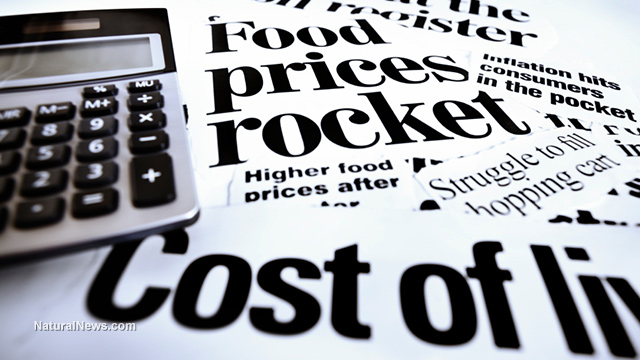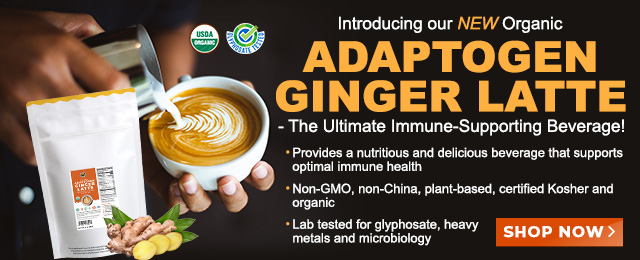How the Bayer-Monsanto merger will cause the price of groceries to skyrocket
Thursday, October 06, 2016 by: Daniel Barker
Tags: Bayer, Monsanto, food prices

(NaturalNews) There are plenty of questions surrounding the proposed mega-merger of Bayer and Monsanto, which (if approved) may mean the creation of the world's biggest agribusiness, but one thing seems certain: The merger will mean higher food prices for all.
Of course, that should come as no surprise. Anytime a monopoly is created, the resulting control over the market means that prices can be set at whatever levels the monopoly sees fit.
And regarding the virtual monopoly over the world's seed supply that the Bayer-Monsanto merger would create, it's difficult to find anyone who isn't predicting a resulting hike in grocery bills.
From Market Watch:
"The consolidation of two big industry players into one of the world's largest agrochemical firms may also limit farmer choice and bargaining power, with increasing seed prices expected to be passed on to the grocery aisles."
Many other experts and opponents of the merger have expressed similar concerns. For example, Robert Lawrence, founder/director of the Center for a Liveable Future, said:
"The consolidation and driving out of smaller competitors, and controlling the marketplace and raising prices of seeds and pesticides for farmers worldwide is going to be a real shock to the food system."
From Foreign Policy:
"[The merger] puts one firm in a pole position to influence, and potentially control, how the world feeds itself. Regulators are likely to investigate whether the merged company will be too big and able to squeeze farmers and shoppers at the price register."
John Vidal wrote in The Guardian that the concerns of those opposed to the merger include the likelihood that "the small farmer will inevitably be blown away, competition could be stifled, and food and farm input prices will rise."
Proposed Bayer-Monsanto merger faces many hurdles
The creation of such a monopoly and the effect on the marketplace is what may prompt European Union, U.S. and other international regulators to reject the deal. In fact, many observers are predicting that the antitrust hurdles faced in gaining approval for the proposed merger may prevent or at least delay its completion.One analyst, Jeremy Redenius of Sanford C. Bernstein & Co., gives the merger only a 50 percent chance of being approved and completed.
Currently, the companies are seeking approval in 30 jurisdictions, including the United States., the EU, Brazil and Canada, and global opposition is mounting. Small farmers' advocacy groups from developing nations, along with other food activist organizations, are banding together to fight the merger.
Many of these groups are planning to put pressure on the United Nations and attend international meetings over the next few months to raise awareness and galvanize the opposition.
Higher food prices are merely the tip of the iceberg
It's not just consumers who face higher prices following the consolidation – small farmers will be forced to pay more for seeds, and many are likely be forced out of business altogether.But higher prices are just one of the dangers of such a merger. The many concerns of those opposed include loss of biodiversity, increased use of the carcinogenic herbicide glyphosate, and the decreased availability of organically-grown foods.
And the consolidation of Bayer and Monsanto – which would lead to their control of roughly 29 percent of the world's seeds and 24 percent of its pesticides – is just one of three agribusiness mega-mergers currently in the works.
Chemical giant Dow is planning a merger with DuPont, and ChemChina is intent on buying Syngenta. If all three mergers are completed, it will mean that three companies will control the majority of the world's seed supply – along with the chemicals and fertilizers used to grow them, and nearly all of the world's GM seed patents.
These dangerous consolidation efforts will lead to higher food prices, increased cancer rates, the demise of small farmers and less food security.
The claim that GM agriculture can help feed a growing world population is in fact a huge lie. These mega-mergers will only benefit the corporations involved, while increasing hunger, poverty and sickness throughout the world.
We, as concerned citizens must unite to stop this madness. One way to do so is to sign this petition.
Sources:
MarketWatch.com
ForeignPolicy.com
TheGuardian.com
EcoWatch.com
Bloomberg.com
NaturalNews.com
ThePetitionSite.com
Vox.com
Bayer at FETCH.news
Get independent news alerts on natural cures, food lab tests, cannabis medicine, science, robotics, drones, privacy and more.
Take Action: Support Natural News by linking to this article from your website
Permalink to this article:
Embed article link: (copy HTML code below):
Reprinting this article:
Non-commercial use OK, cite NaturalNews.com with clickable link.
Follow Natural News on Facebook, Twitter, Google Plus, and Pinterest
- Newly released JFK files reveal Pentagon's role in creating Lyme disease and covid in the same lab
- DEADLY DECEPTION: How COVID vaccines increased mortality rates and why authorities hid the truth
- CDC finally halts $11 billion COVID funding scam as health officials admit the ‘pandemic’ was a fraud
- The hidden dangers in your kitchen: How cooking methods impact diabetes, cancer and aging
- GAIN-OF-FUNCTION CAT-BIRD-FLU now on the rise as nearly a dozen cats in Colorado "test positive" for Bird Flu due to contaminated cat food
- Here are TEN all-natural ways to protect your garden without using harmful chemicals
- Trump's greatest betrayal so far: Accelerating Middle East wars, silencing dissent, and serving Zionist masters
- Why you should think twice before buying mainstream toothpaste formulas
- Ginseng's hidden anti-aging power: How compound K is rewriting the rules of skincare
- ATTENTION PRESIDENT TRUMP: Please WITHDRAW your nomination of Dr. Susan Monarez for CDC Director as she is a VAX FANATIC and TOXIC JAB ZEALOT
- Was JFK's assassination orchestrated by a CIA double agent? New evidence points to James Angleton as the “architect”
- “Endgame: The Hidden Agenda 21” unveils a world of conspiracy and control
- Home gardening for preppers: A beginner's guide to growing your own food
- Senate Democrats deny censorship industrial complex existed, defend government's role in silencing dissent
- Record honeybee deaths devastate U.S. agriculture, pesticides under scrutiny
- Paper or plastic? The environmental deception behind bag bans
- Lab leak confirmed? Boris Johnson's stunning reversal on COVID origins sparks global debate
- Speaker Johnson warns Congress may defund or disband rogue courts targeting Trump
- Newly released JFK files reveal Pentagon's role in creating Lyme disease and covid in the same lab
- Elon Musk: Aliens could be here on Earth RIGHT NOW
- Festive flavors: The sweet history, nutritional profile and health benefits of pecan pie
- Trump reverses course on Gaza plan, says “nobody is expelling Palestinians”
- Reclaim your health: How midlife exercise reverses years of inactivity
- Big Pharma's $8 Billion bribery scheme exposed: how doctors are pushed to prescribe junk science, not heal
- Boys are back in town: Trump’s patriotic alpha crew takes the wheel while toxic females ride in the backseat
- EPA advisor admits the agency is funneling billions to climate groups ahead of Trump’s return to White House
- Space war brewing? Russia threatens to destroy Starlink satellites
- Survival 101: Effective EMF blocking techniques
- A lack of integrity in Academia: Harvard professor found GUILTY of fraudulent research to promote CRT theory
- Mike Adams Sermon 66: God will DESTROY ISRAEL for its wickedness
- 5 Simple steps to boost your brainpower: How to strengthen executive function in a distracted world
- Rep. Nancy Mace introduces bill to ban biological males from female facilities on federal property
- Sugarcane extract superior to cholesterol-lowering drugs?
- WHO focusing more on policing speech about public health and implementing global surveillance systems
- Pilots report mysterious lights 'moving at extreme speeds' across Oregon skies
- Dr. Mike Yeadon releases 15-minute testimony - WATCH - about genocidal intent of COVID “vaccines”
- EPA advisor admits the agency is funneling billions to climate groups ahead of Trump’s return to White House
- The Health Ranger releases “Vaccine Zombie” song and music video, using AI-animated zombies for the music video
- California's social media censorship law struck down: A victory for free speech or a threat to online safety?
- Dr. Mike Yeadon releases 15-minute testimony - WATCH - about genocidal intent of COVID “vaccines”
- The pandemic as a tool for INDOCTRINATION: Understanding “The Indoctrinated Brain” by Dr. Michael Nehls
- Florida takes a stand: DeSantis proposes permanent ban on mRNA vaccine mandates
- Mike Adams releases country western hit single: Goin’ Back in Time is Comin’ Home
- Mike Adams releases music poetry sensation: A Child of God
- “Why we influenced the 2020 elections”: Facebook files reveal the coordinated effort to bury the Hunter Biden laptop story
- RFK Jr. clears key hurdle: Sen. Susan Collins backs controversial HHS nominee, signaling a new era for health policy
- Unpacking the Lies That We’ve Been Fed – new song and music video released by Mike Adams, the Health Ranger
- Mike Adams releases new song and music video: Nothing More Disgusting Than a Globalist
- Newly released JFK files reveal Pentagon's role in creating Lyme disease and covid in the same lab
- Congratulations to the FULLY UNVACCINATED as you resisted the COVID-19 PROPAGANDA MACHINE fueled by over $100 BILLION
- Michigan sheriff announces criminal investigation into 2020 election crimes, Dominion Voting Systems
- Israeli soldiers accused of even more torture and abuse in the West Bank
- Migrants are taking advantage of recent hurricanes to scam residents and loot their homes
- House Intelligence Committee calls for the ARREST and PROSECUTION of Dr. Anthony Fauci
- Red Cross issues warning to stop blood plasma donations from vaccinated people
- Scientists confirm: GENIUS brain function can be spontaneously unleashed in humans without any apparent cause
- EPA advisor admits the agency is funneling billions to climate groups ahead of Trump’s return to White House
- HYSSOP: What research reveals about the health benefits of this ancient holy herb
- Two containers with completed ballots fall out of truck in Florida
- Fully vaccinated about to see “tsunami” of illness and death, warns virologist
- Global leaders unite to clamp down on “misinformation” with UN-backed Cascais Declaration
- BREAKING: 2025 NDAA authorizes mandatory military draft of WOMEN across America… as Pentagon pursues global NUCLEAR war with both Russia and China at the same time
- Michael Yon warns of a ZIONIST TAKEOVER in Trump’s second administration
- BOMBSHELL: DNA testing kits are a SCAM to develop ethnic-specific bioweapons
- Ozempic and Wegovy weight loss drugs are injectable LIZARD VENOM PEPTIDES that may unleash a devastating wave of organ failure… side effects align with symptoms of SNAKE BITES
- Israeli soldiers accused of even more torture and abuse in the West Bank
- These 13 countries just signed an agreement to engineer a global FAMINE by destroying food supply
- NASA admits that climate change occurs because of changes in Earth’s solar orbit, and NOT because of SUVs and fossil fuels
- RFK Jr. clears key hurdle: Sen. Susan Collins backs controversial HHS nominee, signaling a new era for health policy
- Sermon 30: How Jesus reveals Caesar’s FAKE CURRENCY and FALSE AUTHORITY
- Coriander seeds: Ancient medicine backed by modern science
- Arizona officials claim Maricopa County needs 10-13 days to tabulate results of the election
Science News & Studies
Medicine News and Information
Food News & Studies
Health News & Studies
Herbs News & Information
Pollution News & Studies
Cancer News & Studies
Climate News & Studies
Survival News & Information
Gear News & Information
News covering technology, stocks, hackers, and more



"Big Tech and mainstream media are constantly trying to silence the independent voices that dare to bring you the truth about toxic food ingredients, dangerous medications and the failed, fraudulent science of the profit-driven medical establishment.
Email is one of the best ways to make sure you stay informed, without the censorship of the tech giants (Google, Apple, Facebook, Twitter, YouTube, etc.). Stay informed and you'll even likely learn information that may help save your own life."
–The Health Ranger, Mike Adams












































